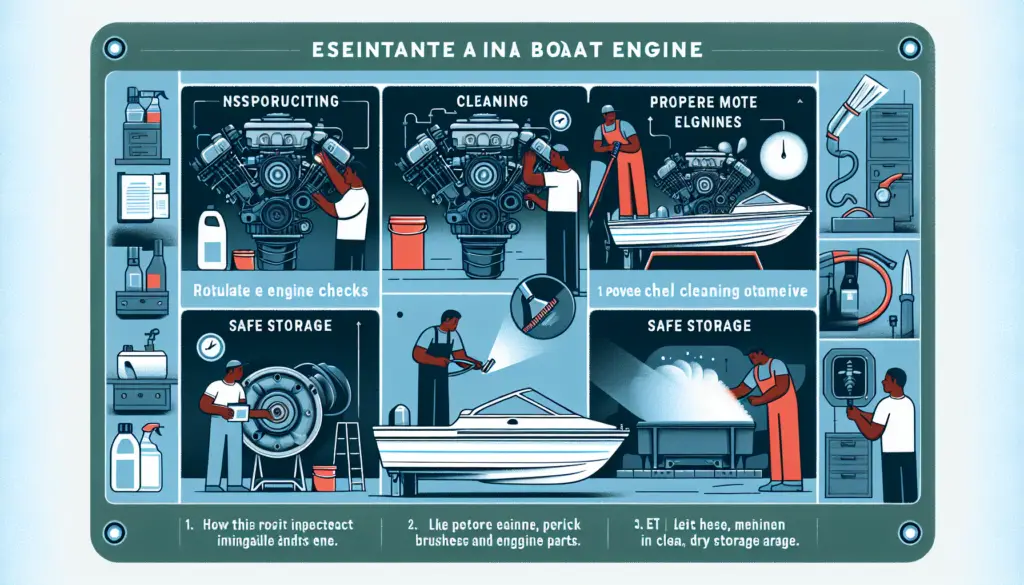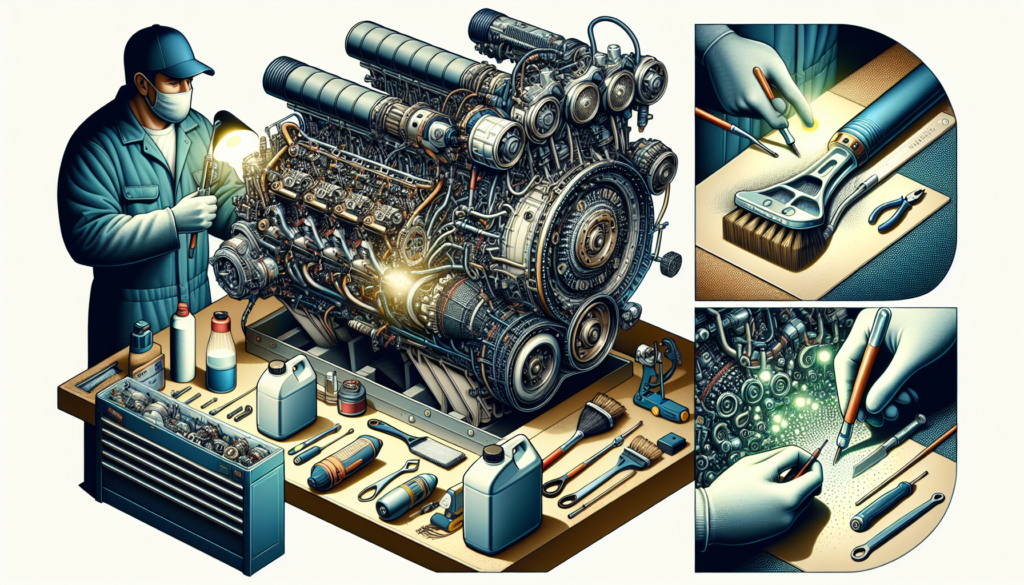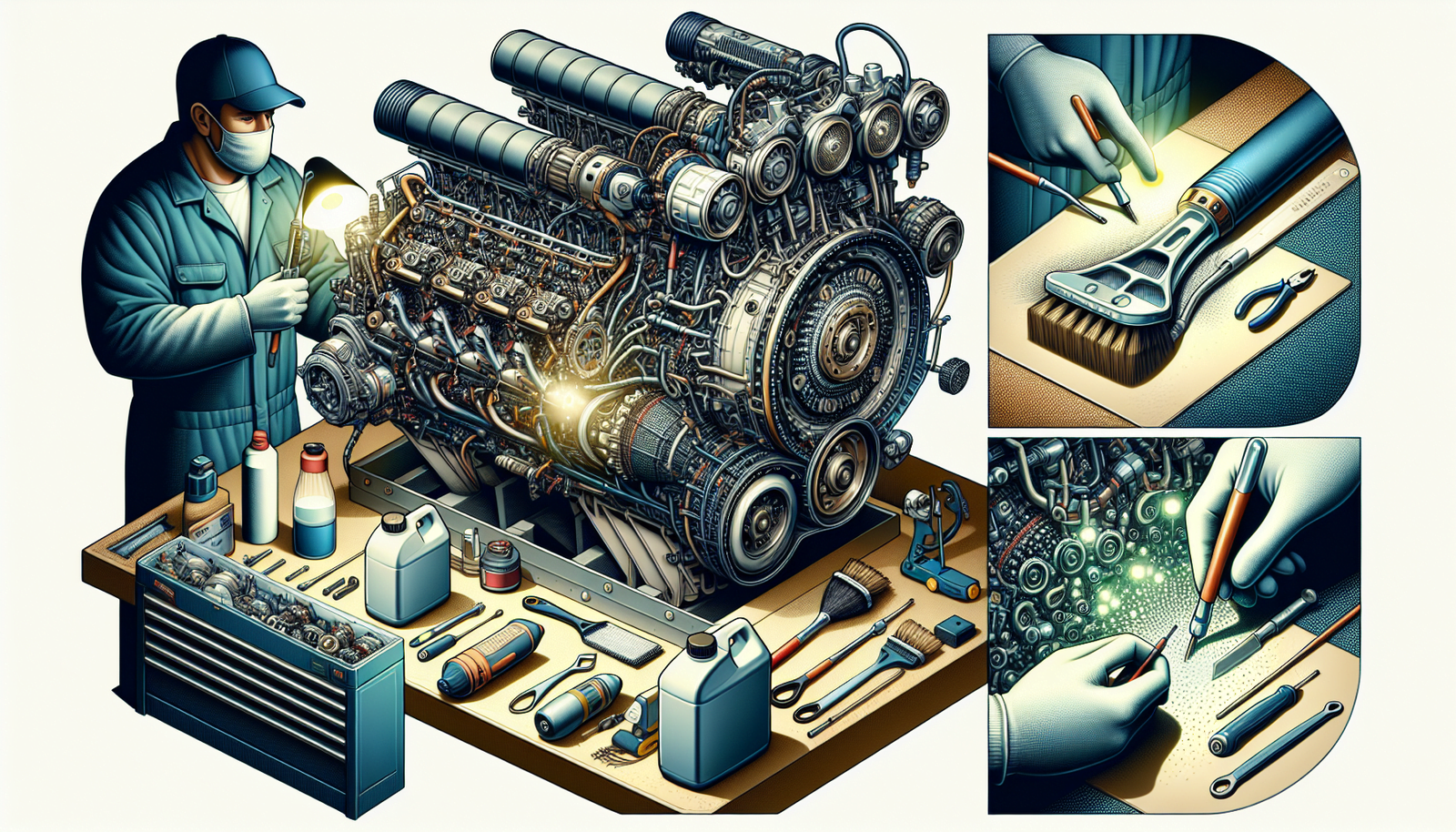In the glimmering world of boating, a smoothly running engine is crucial for those exciting water journeys. The article “The Best Ways To Maintain And Clean Your Boat Engine For Longevity” serves as your valuable assistant, offering effective insights about the optimum strategies to keep your boat engine gleaming and performing at its peak. This piece guides you on how to care and cleanse your precious investment, adding more sailing years to your engine while ensuring efficiency and reliability. So, prepare yourself to learn effective methods that promise resilience, durability, and longevity for your boat engine.

Understanding the Importance of Regular Boat Engine Maintenance
Just like your car, your boat engine requires regular maintenance to keep it humming along smoothly and to ensure its longevity. Many boat owners overlook this crucial part of boat ownership, but in doing so, they may shorten the life of their engine considerably.
The correlation between engine maintenance and longevity
Engines of all types are machines that experience wear and tear. Just as you wouldn’t expect a car engine to last without regular oil changes, your boat engine is much the same. regular maintenance can extend the life of your boat engine, potentially saving you from expensive repairs or even replacement later down the line.
How regular maintenance saves cost in the long run
It may seem like a chore to regularly maintain your boat engine, and yes, it can incur short-term costs. However, regular maintenance is far less expensive than major repairs. For instance, keeping your engine clean and well-lubricated can prevent internal parts from grinding against each other and causing damage. In the long run, the small cost of regular maintenance can save you thousands in repair fees.
Importance of keeping your engine clean
Keeping your engine clean is a significant part of regular maintenance. A clean engine runs smoother and is less likely to have issues such as overheating or blocked filters. Regular cleaning can often be done by yourself, but remember to use the correct products and techniques to avoid causing accidental damage.
Choosing the Right Engine Cleaning Products
Choosing the right cleaning products for your boat engine is crucial. Not all cleaners are suitable or safe for marine use, and using the wrong one can lead to problems down the line.
Selecting environmentally friendly cleaning products
Environmentally friendly cleaners are increasingly popular, and with good reason. Traditional cleaners can harm the marine environment, damage your engine, and even present health risks to you. Look for cleaning products marked as ‘biodegradable’ or ‘non-toxic’ when cleaning your boat engine.
The importance of using marine-specific products
Always use marine-specific cleaning products on your boat engine. These are specially formulated to be safe for both your engine and the marine environment. Using non-marine cleaners can cause corrosion, discolouration, or other damage to your engine.
Different types of cleaning products and their uses
There are several types of cleaning products that you might use on your boat engine, including degreasers, rust removers, and general cleaners. Each of these serves a different purpose. It’s crucial to understand what each product is for and how to use it correctly to avoid causing damage to your engine.
The Correct Use of Cleaning Products
Using cleaning products correctly is not just about applying and wiping them off. You must read the instructions carefully to understand how to use them, follow safety measures, and apply them in the correct way.
Understanding the product instructions
Always read and follow the product instructions when cleaning your boat engine. Different products have different applications and require different amounts of time to work effectively. Failing to follow the instructions can lead to ineffective cleaning or even damage to your engine.
Safety measures during cleaning
Cleaning your boat engine will often involve dealing with harsh chemicals, so always take appropriate safety measures. This might include wearing protective gloves, eye protection, and working in a well-ventilated area.
Methods of applying cleaning products
Different cleaning products might require different methods of application. Some might need to be sprayed on, while others might require a brush or cloth. Always check the instructions and use the correct method for the best results.

Routine Checkups and Assessments
Just like going to the doctor for a checkup, your boat engine needs regular assessments. This can help identify any potential issues early before they become severe and costly.
Frequency of routine check-ups
The frequency of routine check-ups will depend on several factors, including how often you use your boat and your specific engine model. However, as a general rule, your engine should be checked at least once a year.
Areas to assess during checkups
During a checkup, you should assess every part of your engine, including the oil, filters, and belts. Look out for signs of wear, leaks, and corrosion. If anything is amiss, it should be addressed immediately to avoid further damage.
Checking for leaks and corrosion
Leaks and corrosion are often signs of bigger problems. For example, a leak could indicate a worn seal or gasket, while corrosion could suggest an issue with your cooling system. If either of these conditions is present, it’s crucial to get the situation rectified as soon as possible.
Proper Fuel Handling
Proper fuel handling can have a significant influence on your boat engine’s performance and lifespan. It’s essential to choose the right fuel for your engine, store it correctly and be aware of fuel-related issues.
Selecting the right fuel for your boat engine
Different boat engines require different types of fuel, and using the wrong fuel can lead to poor performance or even damage. Always refer to your engine’s manual to know the precise type of fuel it needs.
Proper storage of boat fuel
There are certain regulations for the proper storage of boat fuel that you should adhere to. This may relate to the type of container you use, where it’s stored, and how much fuel you can keep on hand. Poor storage can lead to safety issues.
Maintenance checks for fuel-related issues
Keeping an eye on your fuel system is also a critical part of regular maintenance. This includes looking for leaks in the fuel lines and checking the fuel filter for any blockages.
Changing Engine Oil Regularly
Just like in a car, changing the oil in your boat engine is crucial for its performance and longevity. The oil lubricates the internal parts, reduces friction, and helps keep the engine cool.
Understanding when to change the boat engine oil
The frequency of oil changes will depend on your specific engine model and how often you use your boat. However, as a general rule, you should aim to change the oil at least once a year.
The importance of using marine-grade oil
Always use marine-grade oil in your boat engine. It’s specifically designed to protect against the harsh conditions that occur in the marine environment. Using non-marine oil can lead to premature wear and damage.
Steps to properly change the engine oil
Changing your boat engine oil involves draining the old oil, replacing the oil filter, and adding new oil. It’s a relatively simple process, but if you’re not comfortable doing it yourself, it’s best to get a professional to do it for you.
Maintaining the Cooling System
A working cooling system is crucial to prevent your boat engine from overheating. Regular maintenance should include looking for any leaks, debris and functioning of the thermostat.
Significance of a working cooling system
Without a functioning cooling system, your engine could overheat and suffer irreversible damage. The cooling system circulates cooling water around the engine, dissipating heat and keeping it at an optimum operating temperature.
Routine checkups for cooling system
The cooling system should be included in your regular engine checkups. This involves checking the coolant level, looking for any leaks in the hoses and ensuring the radiator cap is functioning correctly.
Fixing common cooling system issues
Common cooling system issues include leaks, blockages, and a failing thermostat. If any of these conditions occur, it’s critical to fix them as soon as possible to avoid causing more serious damage.
Handling and Maintenance of The Electrical System
The electrical system is an integral part of any boat engine, and it requires regular maintenance to perform optimally.
Understanding the boat engine’s electrical system
The electrical system includes all the parts that provide electricity to your engine, such as the alternator, the battery, and the wiring. Your boat’s engine won’t run without a properly functioning electrical system.
Regular inspections for wiring and other electrical parts
Routine checks of the electrical system should include a careful inspection of the wiring, the alternator, and other electrical parts. Any signs of wear, corrosion, or loose connections should be addressed immediately.
Caring for your battery
Your boat engine’s battery requires some maintenance to last and perform well. This includes keeping it clean and dry, checking the electrolyte level regularly, and ensuring it’s properly charged.
Taking Care of the Propeller
Your boat’s propeller is another component that requires regular maintenance. An improperly maintained propeller can cause poor performance and even damage to your engine.
Importance of propeller in a boat engine
The propeller is responsible for moving your boat through the water. If it’s damaged or not properly maintained, it can create vibration and stress on the engine, leading to poor fuel efficiency and potential damage.
Routine maintenance for propellers
Maintenance for propellers involves regular checks for any signs of damage, ensuring it’s securely attached, and keeping it clean from any marine growth or debris.
Fixing common propeller issues
If your propeller becomes damaged or loose, it’s important to fix these issues quickly. This could involve taking your boat in for a professional propeller service or replacing the propeller altogether if necessary.
Storage and Winterization
Proper storage, especially during the colder months when you may not be using your boat, is crucial for your engine’s longevity.
Suitable conditions for boat storage
The ideal storage conditions for a boat will depend on whether it’s inside or outside and the local climate conditions. However, regardless of where you store your boat, it should be dry, protected from harsh weather, and secure from theft or vandalism.
Winterizing your boat engine
Winterizing your boat engine involves prepping it for periods of non-use in the colder months. This includes draining and replacing engine fluids, disconnecting the battery, and applying fogging oil to protect the engine’s internal parts.
Reasons for professional winterization services
While you can winterize your boat engine yourself if you’re comfortable doing so, there’s also the option to use professional winterization services. This can ensure that the job is done correctly and thoroughly, helping to avoid any winter-related damages to your engine.
This concludes your comprehensive guide on maintaining and cleaning your boat engine. With the correct care and attention, your boat engine will provide you with many seasons of reliable service. Regular maintenance is a small price to pay for the peace of mind it brings. It will also contribute to the longevity of your boat engine, saving you from costly repairs or replacement in the long run. Happy boating!

